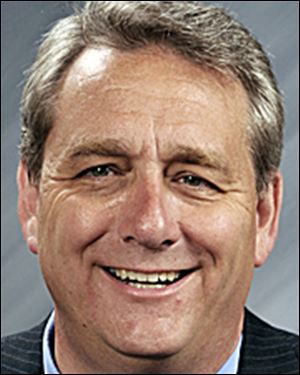
Toledo school district cited for ‘scrubbing’
State audit says TPS, others not on same scale as Columbus
2/12/2013

Yost
COLUMBUS — A state audit released Monday cited Toledo Public Schools for improperly “scrubbing” truant students from attendance rolls but stopped short of the harsher scrutiny directed at the capital’s school district.
The report had few new conclusions about TPS practices than did an interim report released by Auditor Dave Yost in October. Toledo officials long have admitted they withdrew chronically absent students from the classroom and then promptly re-enrolled them to “scrub” them from data reported to the state, though they contend the practice was well-known and done with no ill intent.
While Mr. Yost did not say TPS acted illegally, he and federal investigators continue to delve into a possibly criminal scheme of scrubbing and grade-changing at Columbus City Schools.
The audit did not find a statewide systemic problem with scrubbing and cited just a handful of isolated cases. Named along with Toledo were Cleveland, Cincinnati, and Canton districts, plus the smaller Campbell district in Mahoning County; Marion City; Northridge in Montgomery County, and the Winton Woods and Lockland districts in Hamilton County.
STATE REPORT: Statewide audit of student attendance data and accountability system
The audit has been forwarded to the Ohio Department of Education and the U.S. Department of Education Office of the Inspector General for their review. While Mr. Yost declined to assign motivation on the part of Toledo and other districts, he made it clear they are not considered to be in the same league as Columbus.
He said the difference is “kind and quantity.”
“We are developing a very good picture of what was going on in Columbus, and we haven’t seen those kinds of developments, that kind of evidence elsewhere in the state,” Mr. Yost said.
Students can be legitimately withdrawn for truancy in Ohio, but the report states that students and parents are afforded due process to challenge the truancy designation. For a student to be considered truant — and thus withdrawn — there must be a court adjudication, according to the report.
Toledo had historically removed students from the rolls when they were absent from school five consecutive days without an excuse and 20 days total for the year. The audit reviewed records for 884 students in nine Toledo schools and found 470 where it appeared TPS did not to follow proper procedure.
TPS had voluntarily notified the state of its history after scrubbing practices landed Columbus on newspaper front pages. The superintendent at Columbus since has announced her resignation at the end of this school year, although she’s insisted her decision is not tied to the scandal. Another Columbus administrator at the center of the controversy has resigned.
“Toledo self-reported early in this process,” Mr. Yost said. “The facts are a little bit different on the ground in Toledo than they were elsewhere. What the inspector general concludes and the U.S. Department of Education, I can’t really predict.”
The Ohio education department can sanction districts that inaccurately report data. Those sanctions can include withholding funding, downgrading school or district report-card grades, or the suspension or revocation of employee licenses. Department spokesman John Charlton said Ohio Department of Education officials are still digesting the report before they determine what further action may be taken.
“We are considering what actions need to be taken to correct ratings and rankings that may have been affected by the inaccurate reporting of attendance data,” he said.
Toledo Superintendent Jerome Pecko said he hopes the district won’t be punished, and instead the state would focus on implementing recommendations by Mr. Yost for improvements in the data-reporting process.
Among other recommendations, Mr. Yost said that lawmakers should change state law that forbids the department from connecting data to a specific student and should tie funding to student daily attendance instead of a head count done over one week in October, and that the Ohio Department of Education should increase district oversight.
The report says that in many cases, the audited TPS schools did not follow the 5/20 rule, though it was unclear what process those schools instead used. Auditors also said TPS lacked documentation to support withdrawals.
Mr. Pecko took issue with the audit’s contention that decisions to unenroll chronically absent students were not backed up by district records. He said the auditor from Mr. Yost’s office reviewed students’ physical files, but the supporting documentation could be found in computer files that the auditor did not access. The district is offering that data for study.
State auditor officials said they believe they did review that information, but the documentation to support the withdrawals was not there.
Mr. Pecko said he learned in June that the 5/20 rule was common practice and blamed the Ohio Department of Education for failing to clarify the policy when the district reached out to it in the mid-2000s. When asked why the department had reportedly been unwilling to clarify the situation, Mr. Yost said his office had been unable to confirm that the question had been asked.
Mr. Yost said that disconnect has made it more difficult for the department to oversee student-enrollment counts.
Toledo had been using the 5/20 rule since 2001 but dropped it when the district lost much of its top administration in 2005. The rule was resurrected when school report cards dipped, but this time the district used the rule after receiving its first report from the state on how it was faring on preliminary district report cards.
Mr. Pecko said it would be unfair to punish district employees for using “standing operating procedure.” The district’s test scores fell slightly last year, but Mr. Pecko said he thinks the TPS transformation plan — which caused significant student and staff disruption in its first year — had more to do with the decline than ending the 5/20 practice.
The district has insisted it withdrew truant students regardless of their test scores and even withdrew students in nontested grades.
The district since has taken such decisions out of the hands of individual school buildings and has centralized them in a single office. Students are no longer unenrolled until juvenile court has become involved.
After meeting with the school board, Mr. Pecko announced late last month that he would not accept another three-year contract. The scrubbing investigation has not been cited as a factor in that decision.
The audit sampled student withdrawal decisions with “improper support” at Rogers, Scott, and Start high schools; Byrnedale Middle School; Leverette, East Broadway, McTigue, and Samuel M. Jones at Gunckel Park elementary schools, and the Fulton/Kobacker at Robinson school for students with emotional disabilities.
Contact Jim Provance at:
jprovance@theblade.com
or 614-221-0496.